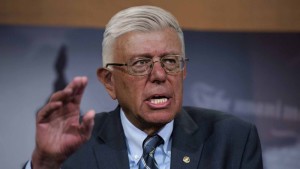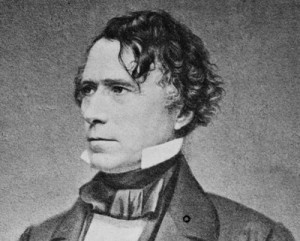This past week Bernie Sanders bristled at a question from Ana Marie Cox, a reporter for The New York Times. She asked, “Do you think it’s fair that Hillary’s hair gets a lot more scrutiny than yours does?” Sanders replied incredulously, “Hillary’s hair gets more scrutiny than my hair? … Is that what you’re asking? … O.K., Ana, I don’t mean to be rude here. I am running for president of the United States on serious issues, O.K.? Do you have serious questions?”
Cox defended her question as one that strikes at the double standard between the way male and female politicians are treated by the media—men can to a large extent expect little if any coverage devoted to their appearances, while women routinely are treated as if a trip to the podium doubles as a trip down the red carpet (a place which has its own double standards). But what was interesting to me about this exchange is that this primary season has in fact included a surprisingly large amount of discussion of the male candidates’ hair. The feminist blog Jezebel, deliberately (albeit humorously) trying to counteract the political double standard, even ran a piece titled “Pricing 2016 GOP Presidential Candidates’ Haircuts.” More seriously, though, hair has acted in at least two cases as symbols for larger questions or propositions concerning the personality and political style of male candidates.
One of those candidates is, of course, Donald Trump. It is almost difficult not to think about Donald Trump’s hair. It has been fodder for late night comics for a very long time now; furthermore, it looks like it could be fodder. But it is a core element of Trump’s personality now, and perhaps a part of his appeal. Certainly it is part of his mystery, especially on the left—is “Trump 2016” a joke that he is in on? Is his campaign a joke that some of his supporters are in on? Or are Trump and/or his supporters so supernaturally oblivious that the haircut/campaign actually looks good to them? Or in the most outlandish hypothesis, is there even a conspiracy orchestrated by Trump and the Clintons to wreck the 2016 election for the Republicans and hand it to the GOP?
I think most commentators are by now convinced that Trump’s supporters are completely in earnest about Trump as a candidate for President and not merely as a vector for expressing discontent and anger, but it was not so many weeks ago that most pundits seemed genuinely confused by whether the support for Trump was not a sort of electoral belch, his poll numbers merely a temporary expulsion of gastric rage before the GOP took a Zantac and nominated a serious candidate.
The point is that, with a haircut like that, it is difficult not to ask questions constantly about Trump regarding the border between artifice and sincerity. Does Trump sincerely believe his hairstyle looks good? If not, what can be the meaning of this fakery? In just the same way, do Trump supporters sincerely believe that he is a valid, viable, and legitimate Presidential candidate? If not, what is the meaning of their support? That they want to push the other Republican candidates rightward, that they want to wreck the election, that they have given up on “real” politics?
Here, I’d like to offer an interpretation of Trump’s appeal that is absolutely grounded in what is, I think, the message of his hair. Trump’s hair says a great deal about what kind of decisions he makes: they use ugliness as prove of their decisiveness, as proof of their force and finality, their rejection of finesse. Trump would rather drop a cosmetic nuke on top of his head than traffic in the kind of half-measures that other politicians (notably Rubio and Walker) take to handle their follicular challenges.[1] Trump will be more brutal, more ugly than he absolutely has to be in order to erase the possibility of backtracking or backsliding. Trump’s hairstyle is the equivalent of Cortés burning his boats. “I will never leave myself an exit strategy,” is the message Trump’s hair broadcasts.
Sanders’s hair—which has its own unofficial Twitter account, by the way—is similarly taken by some of his followers to be a sort of signal of the way he would govern. The Onion ran an article a little over a month ago, titled “Tanned, Exquisitely Coiffed Bernie Sanders Tells Supporters [that] Corporations Actually Have A Lot To Offer,” and ran this picture:
The point here is that Sanders does not look like that because he has not been purchased by the corporations. Instead, his ill-kempt halo of frizz marks him, as one wag has put it, as the “fringe” candidate, as someone who could not be a corporation man because he so patently would not fit in amongst the executives. He rides coach, and he looks like he just got off a rough flight. (Here we might note how potent the double standard is by comparing Sanders to Elizabeth Warren. If she showed up to the Senate with messy hair, she’d be deemed simply incompetent, not virtuous.)
There is a politics of personal authenticity to this in addition to the way that his hair signals his independence of corporate influence. One might say that his the equivalent of a log cabin: he looks like he combs his own hair; he looks like a self-made(-over) man. Sanders is not a candidate of artifice; he has not taken steps to make himself look better than he is. Moreover, his evident indifference to his appearance demonstrates that he has higher priorities: Sanders, we might say, accepts his hair’s thinning because he has better recessions to combat. Why try to redistribute one’s hair when there are more pressing inequalities? In a word, Sanders’s hair tells his supporters that the U.S., the world, needs more than a combover, and that is why they admire him so greatly.
[1] I write this as a man who is himself follicly challenged. Also, I should note that this post was in part inspired by Rivka Mazlish’s great post from December 2013 on “The Significance of Facial Hair in American History.”


2 Thoughts on this Post
S-USIH Comment Policy
We ask that those who participate in the discussions generated in the Comments section do so with the same decorum as they would in any other academic setting or context. Since the USIH bloggers write under our real names, we would prefer that our commenters also identify themselves by their real name. As our primary goal is to stimulate and engage in fruitful and productive discussion, ad hominem attacks (personal or professional), unnecessary insults, and/or mean-spiritedness have no place in the USIH Blog’s Comments section. Therefore, we reserve the right to remove any comments that contain any of the above and/or are not intended to further the discussion of the topic of the post. We welcome suggestions for corrections to any of our posts. As the official blog of the Society of US Intellectual History, we hope to foster a diverse community of scholars and readers who engage with one another in discussions of US intellectual history, broadly understood.
Love the witticisms in the final paragraph. We need more puns at the blog! – TL
An excellent mix of political wit with historical and cultural analysis, this post has one of the best titles I’ve read in the blogosphere and beyond. Along with Rivka’s post, perhaps it opens the door to the intersection of intellectual history and that up and coming interdisciplinary field: hair studies.